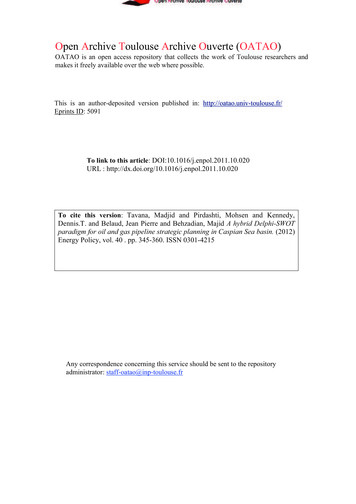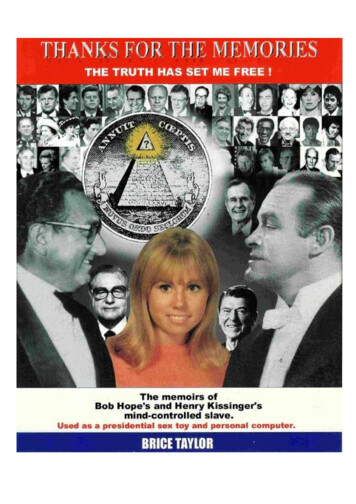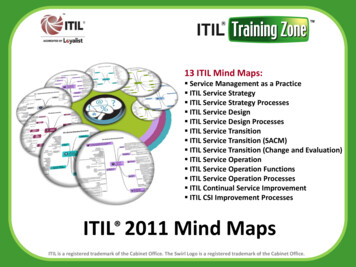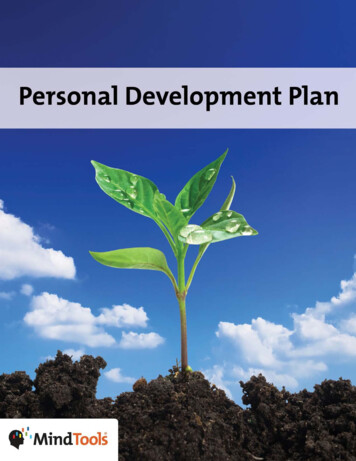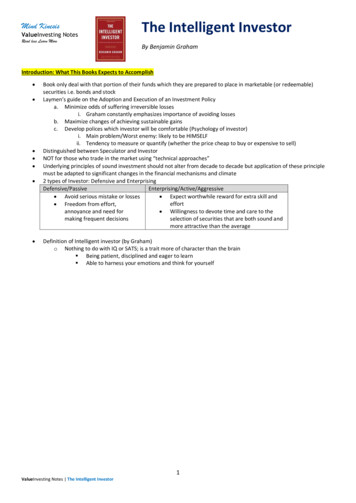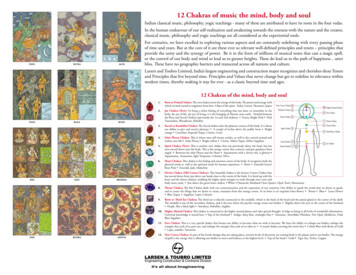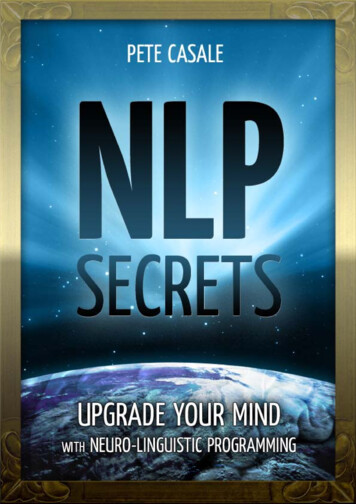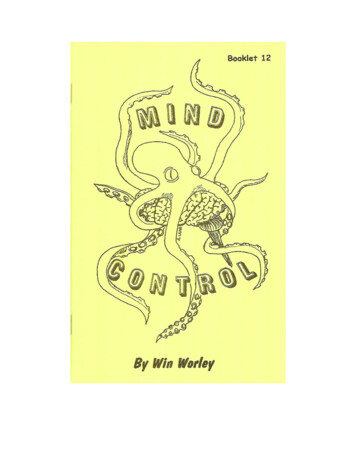
Transcription
MIND LINEThe MAGIC ofConversationalRefrainingNe uro- Se ma ntic sand theTransformationof MeaningBy L. Michael Hall, Ph.D.and Bobby G. Bodenhamer,Foreword by Joseph O'Connor CoAuthor of 'Introduucing NLP"Brand New Second Edition4 New Chapters!
Mind-LinesContents Of Mind-LinesMagical Lines To Transform MindsForeword1997 Hall and BodenhamerCopyright # Txu 814-870Library of CongressWashington, D.C.June 16, 1997ISBN #890001155Published ByE.T. PublicationsP.O. Box 9231Grand Junction, CO 81501(970) 245-3235All rights reserved. No part of this may be reproduced, storedin a retrieval system, or transmitted in any form or by anymeans (electronic, mechanical, photocopying, recording, etc.)without the prior written permission of the publisher.Printed byAction PrintingJerry Kucera, Owner516 Fruitvale Court, Unit CGrand Junction, CO 81504 (970) 434-7701IntroductionMind-Lines TeaseSecond IntroductionLanguage as Magic1. Neuro-Linguistic "Magic"2. Three Facets of Neuro-Linguistic Magic3. Conversational Reframing Patterns4. The Formula68101519315363Directions For Reframing5. Deframing6. Content Reframing7. Pre-Framing and Post-Framing:8. Outframing:9. Analogous or Story Reframing:10. The Magic of Language11. Into the Fray of Mind-Lining12. Eight Things You Should Know About "Meaning"13. How To Do What When14. Getting Into A Magical State15. 87195206211216226Appendix A - NLP Modalities & Submodalities228Appendix B - The Meta-ModelAppendix C - Hierarchy of Language ChartAppendix D - There is no "Is"Appendix E - Neuro-Linguistic Magician CertificateBibliographyGlossary231238239241242244
DedicationWe dedicate this toForewordByJohn Grinder & Richard BandlerJoseph O'ConnorThe First Magicians of this RealmLinda Bodenhamer & Cheryl BuffaMagician Supporters Par Excellenceand to all of the up-and-comingNeuro-Linguistic Magicians-5If you thought linguistics had all the relevance and fascination ofdeclining Latin irregular verbs on a wet Monday afternoon, then preparefor a pleasant shock. Fun to read, and valuable to use, this book invitesyou to play with language.Language makes the bond between us, how we relate to each otherand even if we do relate at all. How do we connect and understandanything? Through language. We all learn it, and how well do we use it?My English Language school studies were confined to interpreting aShakespeare play and being able to tell an intransitive verb from atransitive one. Heaven forbid that it should tell me how to use languagewith purpose, to play with it, to light linguistic fireworks that would burstwith multiple meanings and dazzling eloquence in my listener's mind.Language lies deep level in our minds, we cannot not respond to it.Sticks and stones can break our bones but words can break our hearts.And they can also heal and inspire our spirits.As you read this book, some of the power of language will becomeyours to command. Language both describes and prescribes, youhave to accept certain ideas to understand what you hear. And as itdirects your attention towards some things, it just as surely makesothers invisible. You create whole new worlds every time you read anovel, and you will create meaning as you read this book. Words meannothing without a listener, so as you come to understand how we makemeaning from these intriguing black squiggles on the paper, and thesounds in our heads that are one way we represent language, you willhave more freedom and-6
choice about how you use it.'The man looked at the woman and said "cheese".'What does that mean?It depends on the context that surrounds it. Could this be akitchen scene? Is he being insulting? Telling the punch line of ajoke? Or is she taking his picture? Or perhaps it is an example of anambiguous sentence with multiple meanings that I concocted tomake a point? Words have no meaning without a frame to put themin. Isolated from a meaningful context, you can only shrug yourshoulders and move on.So what? So, if you want to be understood you need to set aframe that tells the other person how to understand what you aresaying in the way you want it understood. And, when responding,it gives you ways to change and play with the frames, or lack ofthem, in what you hear to influence the conversation.Now you have space to ask yourself, not just, 'What does thismean?' But, also, 'What could this mean? And finally maybe, 'What would I like this to mean?'All credit to the authors for making this clear, showing thestructure behind it, and how to use it in practice.So if you are ever asked, what does this really mean? You canlaugh, like a good Zen apprentice and tell a joke. Jokes workbecause they lead you into understanding a situation in one frame,then they pull it out from under leaving you suddenly in another. Astory then, of a now prominent writer when he was a humble collegestudent. He wrote in one of his English compositions, 'The girltumbled down the stairs and lay prostitute at the bottom.'In the margin, the teacher wrote, 'My dear sir, you must learn todistinguish between a fallen woman and one who has merelyslipped!'Joseph O'ConnorCo-Author of Introducing NLPLondon, July 1997-7IntroductionWe have found a magical formula box wherein lies all kinds ofwonderful and horrible things. Like a magician with his or hermagical box from which to pull, and put, all kinds of wild and crazythings—the magical formula box to which we refer lives insidehuman minds. Even you have one inside your head! The humanbrain produces it, and yet the magic box transcends the brain.In this book you will discover how to identify your magical formulabox from which, and by which, you construct your heavens andyour hells. You will learn how that everyday you pull things out ofyour box to your weal or to your woe.What semantic magic did you pull out of it today?What magic will you learn to pull out of it tomorrow?Would you like more weal than woe?You will also discover how you can put new and more enhancingformulas for new kinds of "magic" into your box to make your lifemuch more filled with love, joy, faith, hope, and resourcefulness.Alright!And because everybody you meet also has a magical formulabox—you will learn some very, very powerful magic in yourinteractions with others. You will learn magic that will enable you tochange realities, to alter the direction of life, to change the past, torestructure emotions, to shift paradigms, to leap logical levels at asingle bound, and to jump off tall towers of terror in a single leap, toutter mind-lines and see demons vanish and heavens spring intoexistence, and much more.Does this Interest you? Then come with us to explore your ownpersonal neuro-linguistics and neuro-semantics. Become amagician so that you can use your meaning-making powers withgrace and power.Mine those mind-lines that will change your mind for good—change it so that you can run your own brain, make those changesyou want, and keep the change forever. Learn to become truly-8
elegant and professional in the mind-lines you offer to yourassociates, loved ones, and friends.Now to tease your mind about the possibilities of neuro-linguisticmagic, we have provided the following section of one example. Ifyou don't know what some of the descriptive labels means—give itno thought at this point. You'll learn them later. For now, just allowyourself to enjoy the "Sleight of Mouth" shifts and notice which oneswork most impactfully on you. The magic within language andlanguage expressions depend on several factors: your presentstate, how and when someone delivers them, in what context, etc.Play around with them. See which ones work most powerfully withyour friends and relatives.We have sought to humorize and popularize this domain inneuro-linguistics that otherwise might seem academic, difficult tograsp, and conceptually deep. Now why in the world did we dothat? Because we believe that we don't have to play the languagegame using the insights and formulations from Linguistics, GeneralSemantics, or NLP in a boring way or over-scholarly way. So comeand enjoy the play with us. And bring along your magic formulabox. You know, that stuff in your brains that generates the magic.And with that, now let the wonder of magic begin!Michael and BobMay, 1997For play?Mind-Lines TeasingIn the pages that follow you will learn about the magic box. Init you will find your constructions of "meaning." The text of thiswork will focus on assisting you in how to find this magic box andhow to pull magical lines out of that box to conversationally reframesomeone's thinking (even your own).By the time you complete this work, you will have learned twentyexplicit ways to reframe beliefs, ideas, and understandings. Thismeans that when you tune in to your own internal dialogue ofmeaning-making or hear someone else's, and you hear ideas sureto poison the mind, disrupt the emotions, and sabotage the processof taking effective action—you will now have at least twenty ways totransform that reality.Talk about living with more choices and options about how tolook at things! Having at least twenty ways to frame your thinkingwill give you twenty different ways to feel, twenty different ways torespond, and twenty different frames of reference to play with.As an encouragement to work through the theoretical chapters inorder to deepen your understanding and appreciation ofLanguage as Magic (Chapters. 1-3 & 9), and to tackle theReframing Directions (Chapters 4-8), we now offer one extensiveexample of the "Sleight of Mouth" reframing that can result whenlearning how to detect and create mind-lines. In Chapter 11, wehave more examples to serve as both a model and to stimulate yourown playful creativity.20 Ways to Reframe "Failure"Consider the toxic ideas in this statement:"Whenever I don't succeed, it really bothers me. Itmakes me feel like a failure. I just hate not reachingmy goals for that purpose."-9-10
1) Chunking DownSo you think you "are" a "failure," do you? So as you thinkabout something for which you define yourself as "a failure,"how specifically do you represent this idea? What pictures,sounds, feelings, and words do you use to create thismeaning? How do you represent the action of failing at onething as "making" you a failure?2) Reality Strategy Chunk DownSo up until now, you have accepted the idea of viewing anddefining yourself as "a failure." Well, help me understandthis. How specifically do you know that failing at one thingon a particular day makes you "a failure?" What do you seefirst, then what do you say about that, and so on as youthink about this? To teach me how to do this the way youdo, what would I have to think, see, hear, etc.?3) Reframe the EBThe significance of not reaching your goal means that youhave received information about numerous ways that willnot get you there. Now you can feel free to explore newpossible avenues, can you not?4) Reframe the ISInteresting that you say that. What I really find as a failure—and I mean Failure with a big "F"--occurs when someonedoesn't reach a goal, and then just sits down in the dirt andquits, and won't learn or try again. I'd call that a "failure."5) Reflexively Apply To SelfDoes that mean if you don't reach your goal in presentingthis limiting and painful belief to me, that just talking to mewill turn you into a failure?6) Reflexively Apply to ListenerThen with that way of thinking about things, if I don'tsucceed in coming up with a good way of responding andhelping you with this distress, I will become a big failurealso! In other words, my success or failure as a humanbeing depends on succeeding in this conversation in just theright way?7) Counter-Example FramingWhen you think about some of your successes—and howgood and resourceful you feel about them, you mean if youmispronounced a word, or failed in any aspect of any goalsurrounding that, that such would turn you into a failure?8) Positive Prior Intentional FramingReaching the goals that you set for yourself must mean a lotto you. I can imagine that you take that view in order toprotect yourself from messing things up and to push yourselfto higher levels. And since you want that, perhaps someother attitudes about failure might help you to really succeedin your goals.9) Positive Prior Causation FramingIt seems important to you to set and reach goals. So youprobably have taken on this limiting belief because you havehad some painful experiences and you want to protectyourself against more pain. I wonder what other beliefs youcould build that you would find even more effective than thisone?10) First OutcomeWhat results for you when you move through life definingexperiences and yourself as "failures" just because youdon't reach a goal as you want to? Do these serve you well insetting and reaching goals or in feeling successful? Do youlike those negative unresourceful feelings?11) Outcome of OutcomeImagine going out, say five or even ten years from now,after you have defined every unsuccessful attempt atreaching a goal as turning you into a "failure," and then livingfrom that "failure" identity and feeling unresourceful. whatwill come out of that? Will you take on many risks? Whatother outcomes emerge when you feel like a "failure" andtake that into your future?12) Eternity FramingWhen I think about this, I wonder what you will think whenyou look back on this belief about failure when you step overinto eternity, and I wonder how you will think and fee! aboutthis limiting belief that you used as you moved through life?13) Model of the World FramingWhat an interesting way to think about events that sooverloads them with meaning! Do you know where you gotthis map about "one un-success equally failing?" Do youknow that most people don't use that map to torturethemselves?-12
14) Criteria/Value FramingWhen you think about your values of enjoying life,appreciating people, doing your best, etc., do you not thinkof those values as more important the making than "succe
Semantics, or NLP in a boring way or over-scholarly way. So come and enjoy the play with us. And bring along your magic formula box. You know, that stuff in your brains that generates the magic. And with that, now let the wonder of magic begin! Michael and Bob May, 1997 -9-For play? Mind-Lines Teasing

